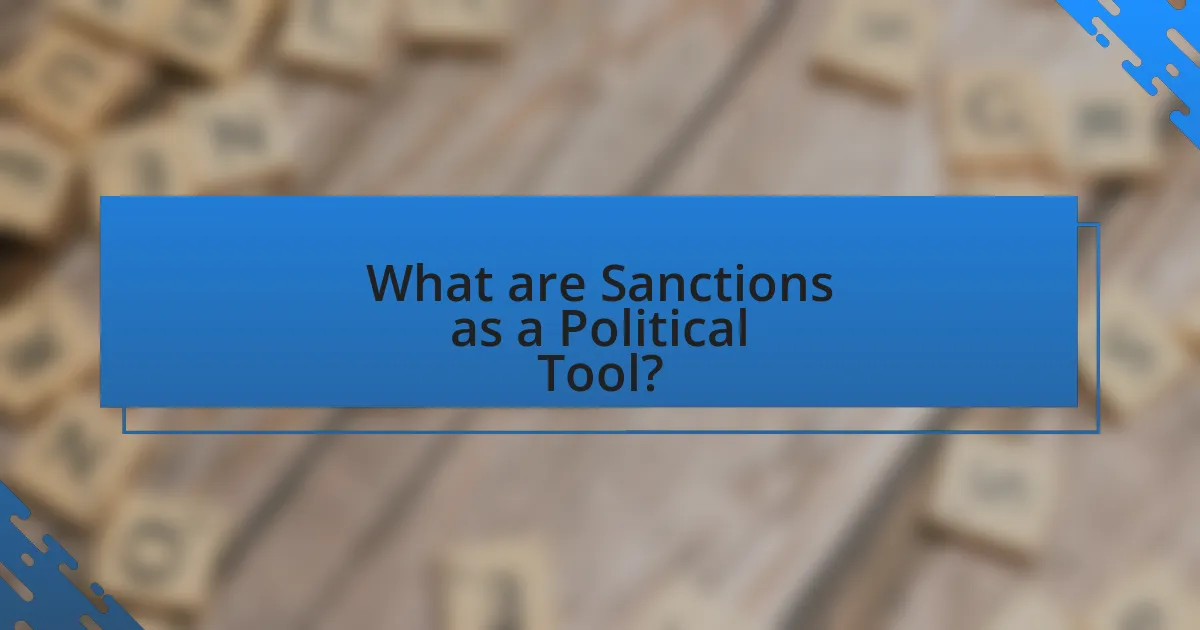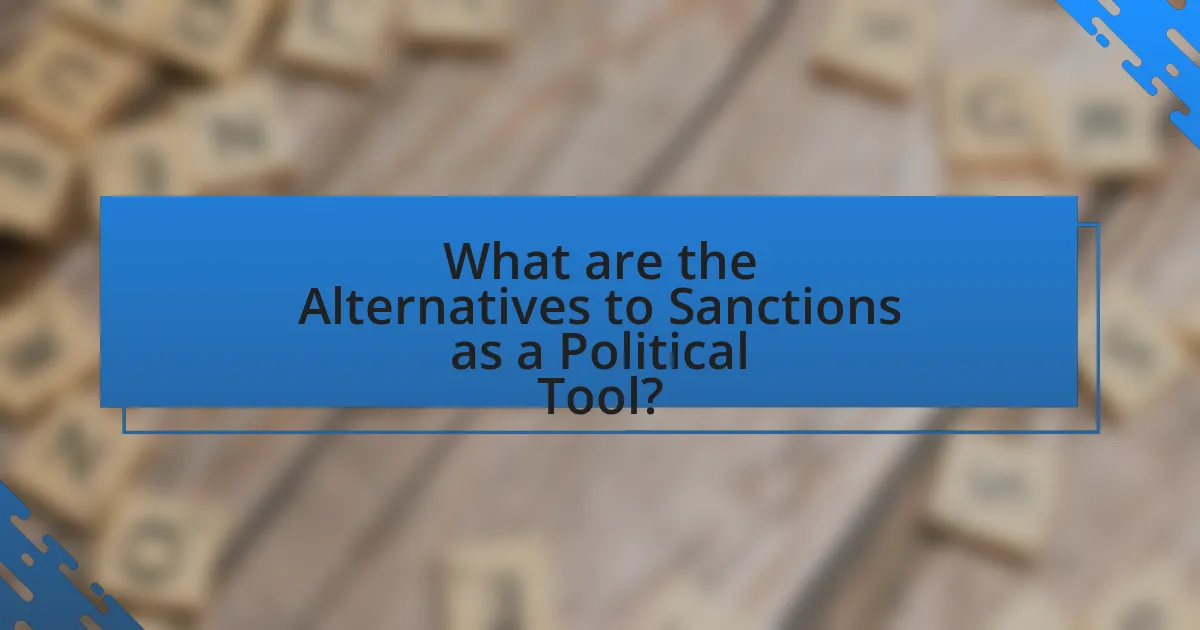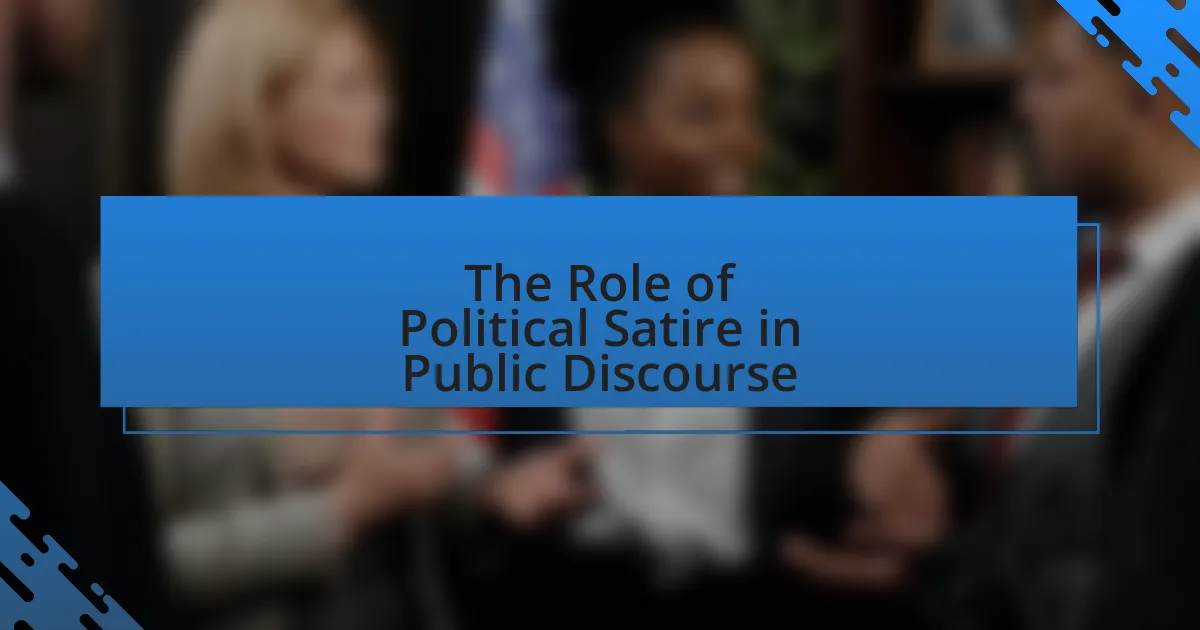Sanctions are measures imposed by countries or international organizations to influence the behavior of a target state or entity, often through economic restrictions, trade barriers, or diplomatic isolation. This article analyzes the effectiveness of sanctions as a political tool, exploring their function in international relations, the types commonly used, and the objectives governments aim to achieve. It examines historical examples, the impact of sanctions on targeted nations, and the factors contributing to their success or failure. Additionally, the article discusses alternatives to sanctions, the role of international organizations in conflict resolution, and best practices for enhancing the effectiveness of sanctions.

What are Sanctions as a Political Tool?
Sanctions as a political tool are measures imposed by countries or international organizations to influence the behavior of a target state or entity. These measures can include economic restrictions, trade barriers, or diplomatic isolation aimed at compelling compliance with international laws or norms. For instance, the United Nations imposed sanctions on Iraq in the 1990s to enforce compliance with resolutions regarding its invasion of Kuwait, demonstrating how sanctions can serve as a mechanism for international governance and conflict resolution.
How do sanctions function in international relations?
Sanctions function in international relations as tools used by countries or international organizations to influence the behavior of a target state or entity. They typically aim to compel compliance with international laws or norms, deter undesirable actions, or signal disapproval of certain behaviors, such as human rights violations or aggression. For instance, the United Nations imposed sanctions on Iraq in the 1990s to pressure the regime to comply with disarmament obligations following the Gulf War. These measures can include economic restrictions, trade embargoes, travel bans, and asset freezes, which are designed to create economic hardship or political isolation for the targeted entity. The effectiveness of sanctions often depends on factors such as the level of international support, the target’s economic resilience, and the specific goals set by the imposing entities.
What types of sanctions are commonly used?
Commonly used sanctions include economic sanctions, trade sanctions, diplomatic sanctions, and military sanctions. Economic sanctions restrict financial transactions and trade, often targeting specific sectors or entities, as seen in the sanctions imposed on Iran to limit its nuclear program. Trade sanctions involve prohibiting or limiting trade with a country, exemplified by the U.S. embargo against Cuba. Diplomatic sanctions reduce or sever diplomatic ties, such as the expulsion of diplomats in response to aggressive actions. Military sanctions may include arms embargoes, restricting the sale of weapons to a nation, as implemented against North Korea. Each type of sanction serves to exert pressure on a state to change its behavior without resorting to military intervention.
How do sanctions differ from other political tools?
Sanctions differ from other political tools primarily in their coercive nature, as they are designed to impose economic or political penalties on a target to influence behavior. Unlike diplomatic negotiations or military interventions, sanctions specifically restrict trade, financial transactions, or access to resources, aiming to compel compliance with international norms or policies. For instance, the United Nations imposed sanctions on Iraq in the 1990s to pressure the regime to disarm, demonstrating how sanctions can serve as a non-military means of exerting influence.
Why are sanctions imposed by countries?
Sanctions are imposed by countries primarily to influence the behavior of other nations or entities. These measures aim to achieve specific political objectives, such as deterring aggression, promoting human rights, or enforcing international laws. For instance, the United States has imposed sanctions on North Korea to curb its nuclear weapons program, reflecting a strategic effort to maintain global security. Historical examples, such as the sanctions against South Africa during apartheid, demonstrate how economic pressure can lead to significant political change.
What objectives do governments aim to achieve with sanctions?
Governments aim to achieve several key objectives with sanctions, primarily to alter the behavior of targeted states or entities. These objectives include compelling compliance with international laws, deterring aggressive actions, and signaling disapproval of specific policies or actions. For instance, economic sanctions imposed on Iran aimed to curb its nuclear program by restricting access to financial markets and essential goods, thereby pressuring the government to negotiate. Additionally, sanctions can serve to isolate a regime diplomatically, undermine its legitimacy, and protect national security interests. Historical examples, such as the sanctions against South Africa during apartheid, demonstrate how targeted measures can contribute to significant political change.
How do sanctions impact the targeted nation?
Sanctions significantly impact the targeted nation by restricting its economic activities and access to international markets. These restrictions can lead to decreased GDP, increased inflation, and shortages of essential goods, as evidenced by the economic decline in Iran following the imposition of sanctions in 2012, which resulted in a 6.6% contraction of its economy. Additionally, sanctions can exacerbate social issues, leading to increased poverty and unemployment rates, as seen in Venezuela, where sanctions contributed to a humanitarian crisis affecting millions. The overall effect of sanctions often undermines the targeted nation’s political stability and can provoke further resistance against the sanctioning countries.
What are the historical examples of sanctions?
Historical examples of sanctions include the United Nations sanctions against South Africa during the apartheid era, which aimed to pressure the government to end racial segregation. Another significant example is the economic sanctions imposed on Iraq following its invasion of Kuwait in 1990, which sought to compel Iraq to withdraw its forces. Additionally, the sanctions against Iran, particularly those targeting its nuclear program, have been a prominent case since the early 2000s, aiming to curb its nuclear ambitions. These examples illustrate how sanctions have been utilized as a political tool to influence state behavior and achieve specific international objectives.
How effective were sanctions in past political conflicts?
Sanctions have proven to be effective in various past political conflicts, particularly when they are comprehensive and multilateral. For instance, the economic sanctions imposed on South Africa during the apartheid era significantly contributed to the end of racial segregation, as they isolated the country economically and politically, leading to internal pressure for reform. Additionally, the sanctions against Iran aimed at curbing its nuclear program resulted in substantial economic hardship, which ultimately brought Iran to the negotiating table, culminating in the Joint Comprehensive Plan of Action in 2015. These examples illustrate that sanctions can compel political change when they are strategically implemented and supported by the international community.
What lessons can be learned from historical sanctions?
Historical sanctions demonstrate that their effectiveness often hinges on the unity and commitment of the imposing countries. For instance, the comprehensive sanctions against South Africa during the apartheid era were successful in pressuring the government to change its policies due to widespread international support. Conversely, the sanctions imposed on Iraq in the 1990s had mixed results; while they aimed to weaken Saddam Hussein’s regime, they also led to significant humanitarian crises without achieving their political objectives. These examples illustrate that sanctions can be effective when there is a clear goal, international consensus, and consideration of humanitarian impacts.

How Effective are Sanctions in Achieving Political Goals?
Sanctions are moderately effective in achieving political goals, often depending on the context and the specific objectives targeted. Historical examples illustrate this effectiveness; for instance, the economic sanctions imposed on South Africa during the apartheid era significantly contributed to the end of racial segregation by pressuring the government to change its policies. Similarly, sanctions against Iran aimed at curbing its nuclear program have led to negotiations, resulting in the Joint Comprehensive Plan of Action in 2015. However, sanctions can also have limited success, as seen in the case of North Korea, where extensive sanctions have not yet led to denuclearization. The effectiveness of sanctions is influenced by factors such as the unity of the international community, the targeted country’s economic resilience, and the presence of alternative support systems.
What metrics are used to measure the effectiveness of sanctions?
Metrics used to measure the effectiveness of sanctions include economic indicators, compliance rates, and political outcomes. Economic indicators such as GDP growth, trade volume, and inflation rates provide quantitative data on the economic impact of sanctions on the targeted country. Compliance rates assess how well the targeted entity adheres to the sanctions, often measured through trade patterns and financial transactions. Political outcomes evaluate changes in behavior or policy of the sanctioned entity, such as shifts in foreign policy or internal governance, which can be analyzed through diplomatic communications and public statements. These metrics collectively help in assessing the overall impact and success of sanctions as a political tool.
How do economic indicators reflect the impact of sanctions?
Economic indicators reflect the impact of sanctions by showing measurable changes in a country’s economic performance, such as GDP, inflation rates, and trade balances. For instance, after the imposition of sanctions, countries often experience a decline in GDP due to reduced trade and investment, as seen in Iran following the 2012 sanctions, where GDP contracted by approximately 6.6% in 2013. Additionally, inflation rates may surge as supply chains are disrupted, leading to increased prices for goods, which was evident in Venezuela, where hyperinflation followed sanctions. Trade balances also shift, with exports decreasing significantly; for example, Russia’s exports fell by 30% in the months following sanctions imposed in 2014. These indicators provide concrete evidence of the economic consequences of sanctions, illustrating their effectiveness as a political tool.
What role does public opinion play in sanction effectiveness?
Public opinion significantly influences the effectiveness of sanctions by shaping political will and public support for their implementation. When the public perceives sanctions as justified and necessary, political leaders are more likely to maintain or strengthen these measures, as seen in cases like the sanctions against South Africa during apartheid, where widespread public support bolstered the international community’s resolve. Conversely, if public opinion turns against sanctions, political leaders may face pressure to lift them, undermining their intended impact. Research indicates that sanctions are more effective when they align with public sentiment, as demonstrated in studies analyzing the correlation between public support and the longevity of sanctions.
Why do some sanctions fail to achieve their intended outcomes?
Some sanctions fail to achieve their intended outcomes due to factors such as lack of international support, targeted entities’ resilience, and unintended economic consequences. For instance, when sanctions are not universally adopted, the targeted nation can seek alternative trade partners, diminishing the sanctions’ impact. Additionally, regimes may adapt to sanctions by finding ways to circumvent them, such as developing domestic industries or engaging in illicit trade. Historical examples include the sanctions imposed on North Korea, which have not led to denuclearization despite extensive international efforts, illustrating the limitations of sanctions as a political tool.
What factors contribute to the failure of sanctions?
The failure of sanctions can be attributed to several key factors, including lack of international support, the targeted country’s economic resilience, and the presence of alternative trade partners. When sanctions are not universally supported, such as in the case of unilateral sanctions, the targeted nation can often find ways to circumvent restrictions through trade with non-compliant countries. For instance, North Korea has successfully engaged in trade with China despite international sanctions, demonstrating economic resilience. Additionally, if the targeted country has a diversified economy or access to alternative resources, the impact of sanctions can be significantly diminished. Historical examples, such as the sanctions imposed on Iraq in the 1990s, illustrate that while sanctions aim to compel compliance, they can fail to achieve their intended political objectives when these factors are present.
How do targeted nations adapt to sanctions?
Targeted nations adapt to sanctions by implementing economic diversification, strengthening domestic industries, and seeking alternative trade partnerships. For instance, countries like Iran have developed local production capabilities to reduce reliance on imported goods, while also increasing trade with nations such as China and Russia to circumvent restrictions. Additionally, these nations often enhance their diplomatic efforts to negotiate sanctions relief or to build coalitions that can provide economic support, as seen in Venezuela’s attempts to engage with other Latin American countries. These strategies demonstrate a proactive approach to mitigate the adverse effects of sanctions on their economies and political stability.
What are the unintended consequences of sanctions?
Unintended consequences of sanctions include economic hardship for civilians, strengthening of authoritarian regimes, and the potential for increased conflict. Economic sanctions often lead to inflation, unemployment, and shortages of essential goods, disproportionately affecting the general population rather than the targeted political leaders. For instance, sanctions imposed on Iraq in the 1990s resulted in significant suffering for civilians, with estimates of hundreds of thousands of deaths due to malnutrition and lack of medical supplies. Additionally, sanctions can bolster the resolve of authoritarian governments, as they may use external pressure to rally domestic support and suppress dissent. This phenomenon was observed in North Korea, where sanctions have reinforced the regime’s narrative of external threats. Lastly, sanctions can escalate tensions and provoke retaliatory actions, as seen in the case of U.S. sanctions on Iran, which have contributed to regional instability and military confrontations.
How do sanctions affect civilian populations?
Sanctions adversely affect civilian populations by restricting access to essential goods and services, leading to increased poverty and health crises. For instance, economic sanctions can limit the availability of food, medicine, and clean water, which directly impacts the well-being of civilians. A study by the World Health Organization in 2019 indicated that sanctions imposed on countries like Iran resulted in a significant rise in preventable diseases due to lack of medical supplies. Furthermore, the United Nations reported that sanctions can exacerbate humanitarian crises, as seen in the case of Iraq in the 1990s, where sanctions contributed to the deaths of hundreds of thousands of children due to malnutrition and lack of medical care. These examples illustrate that while sanctions aim to pressure governments, they often inflict severe harm on the civilian population.
What are the geopolitical ramifications of imposing sanctions?
Imposing sanctions can lead to significant geopolitical ramifications, including shifts in international alliances and increased tensions between nations. For instance, sanctions against Russia following its annexation of Crimea in 2014 resulted in a realignment of Russia’s foreign policy, fostering closer ties with countries like China and Iran. Additionally, sanctions can provoke retaliatory measures, as seen when countries targeted by sanctions often respond with their own economic restrictions, further escalating conflicts. The long-term effects may include the emergence of alternative trade networks that bypass sanctioned nations, altering global economic dynamics. These outcomes illustrate how sanctions can reshape geopolitical landscapes and influence global power structures.

What are the Alternatives to Sanctions as a Political Tool?
Alternatives to sanctions as a political tool include diplomatic negotiations, economic incentives, military intervention, and multilateral cooperation. Diplomatic negotiations can facilitate dialogue and conflict resolution, as seen in the Iran nuclear deal, where discussions led to a temporary halt in nuclear activities without sanctions. Economic incentives, such as trade agreements or financial aid, can encourage compliance with international norms, exemplified by the European Union’s approach to countries like Ukraine. Military intervention, while controversial, can be employed to address immediate threats, as demonstrated in humanitarian interventions. Lastly, multilateral cooperation through international organizations can foster collective action and pressure, as seen in the United Nations’ efforts to address global issues. Each of these alternatives offers distinct mechanisms for influencing state behavior without resorting to sanctions.
What diplomatic strategies can replace sanctions?
Diplomatic strategies that can replace sanctions include negotiation, dialogue, and incentives. These approaches focus on engaging with the targeted nation to address underlying issues rather than imposing punitive measures. For instance, historical examples such as the Iran nuclear deal demonstrate how negotiations can lead to agreements that limit nuclear proliferation without resorting to sanctions. Additionally, offering economic incentives or development aid can encourage compliance with international norms, as seen in the case of North Korea’s denuclearization talks, where economic benefits were proposed in exchange for disarmament. These strategies can foster cooperation and build trust, potentially leading to more sustainable outcomes than sanctions alone.
How do negotiations differ from sanctions in achieving political goals?
Negotiations differ from sanctions in achieving political goals primarily in their approach and outcomes. Negotiations involve dialogue and compromise between parties to reach a mutually acceptable agreement, fostering cooperation and potentially leading to long-term solutions. In contrast, sanctions are punitive measures imposed to coerce a change in behavior, often resulting in economic hardship and strained relations without direct dialogue. Historical examples illustrate this difference; for instance, the 2015 Iran nuclear deal was achieved through negotiations, leading to a reduction in nuclear activities, while sanctions imposed on North Korea have not resulted in significant changes in its nuclear program, highlighting the limitations of coercive measures.
What role do international organizations play in conflict resolution?
International organizations play a crucial role in conflict resolution by facilitating dialogue, providing mediation, and implementing peacekeeping operations. For instance, the United Nations has been instrumental in mediating conflicts through initiatives like the UN Peacekeeping Forces, which have been deployed in various regions, such as the Democratic Republic of the Congo, to maintain peace and security. Additionally, organizations like the African Union and the European Union engage in diplomatic efforts to resolve disputes, often employing sanctions as a tool to pressure conflicting parties into negotiations. Historical examples include the EU’s sanctions against Serbia during the Yugoslav Wars, which aimed to encourage compliance with peace agreements. These actions demonstrate how international organizations leverage their influence to foster stability and promote conflict resolution.
How can sanctions be improved for better effectiveness?
Sanctions can be improved for better effectiveness by ensuring they are targeted, comprehensive, and accompanied by clear communication of objectives. Targeted sanctions focus on specific individuals or entities, minimizing collateral damage to the general population, which can enhance their legitimacy and impact. Comprehensive sanctions should cover all sectors that contribute to the undesired behavior, thereby increasing pressure on the sanctioned entity. Clear communication of the goals and expected outcomes of the sanctions helps to align international support and encourages compliance. Historical examples, such as the targeted sanctions against individuals in the Iranian nuclear program, demonstrate that precision in sanctions can lead to more effective diplomatic negotiations.
What best practices can enhance the impact of sanctions?
To enhance the impact of sanctions, it is essential to ensure they are targeted, comprehensive, and coordinated among international partners. Targeted sanctions focus on specific individuals or entities, minimizing collateral damage while maximizing pressure on decision-makers. Comprehensive sanctions, which cover multiple sectors, can create broader economic challenges for the sanctioned state, thereby increasing the likelihood of compliance. Coordination among international partners amplifies the effectiveness of sanctions, as unified actions prevent evasion and reinforce the message of international disapproval. Historical examples, such as the coordinated sanctions against Iran, demonstrate that these best practices can lead to significant diplomatic negotiations and policy changes.
How can international cooperation strengthen sanction regimes?
International cooperation can strengthen sanction regimes by ensuring unified enforcement and increasing the legitimacy of the measures. When multiple countries collaborate on sanctions, they create a broader and more consistent pressure on the targeted entity, making it more difficult for that entity to evade restrictions. For instance, the coordinated sanctions against Iran by the United States, European Union, and other nations significantly impacted Iran’s economy and its nuclear program, demonstrating the effectiveness of a multilateral approach. Additionally, shared intelligence and resources among cooperating nations enhance the monitoring and enforcement of sanctions, leading to greater compliance and effectiveness.
What are the practical considerations for policymakers regarding sanctions?
Policymakers must consider the potential economic impact, the targeted country’s resilience, and the likelihood of achieving desired political outcomes when implementing sanctions. Economic impact includes assessing how sanctions will affect both the target nation and the sanctioning country, as seen in the case of U.S. sanctions on Iran, which significantly impacted global oil prices. The resilience of the targeted country is crucial; for instance, North Korea has demonstrated an ability to withstand sanctions through illicit trade and domestic resource mobilization. Finally, the likelihood of achieving political objectives must be evaluated, as sanctions can sometimes entrench the resolve of the targeted regime, as evidenced by the long-standing sanctions against Cuba, which have not led to regime change.





